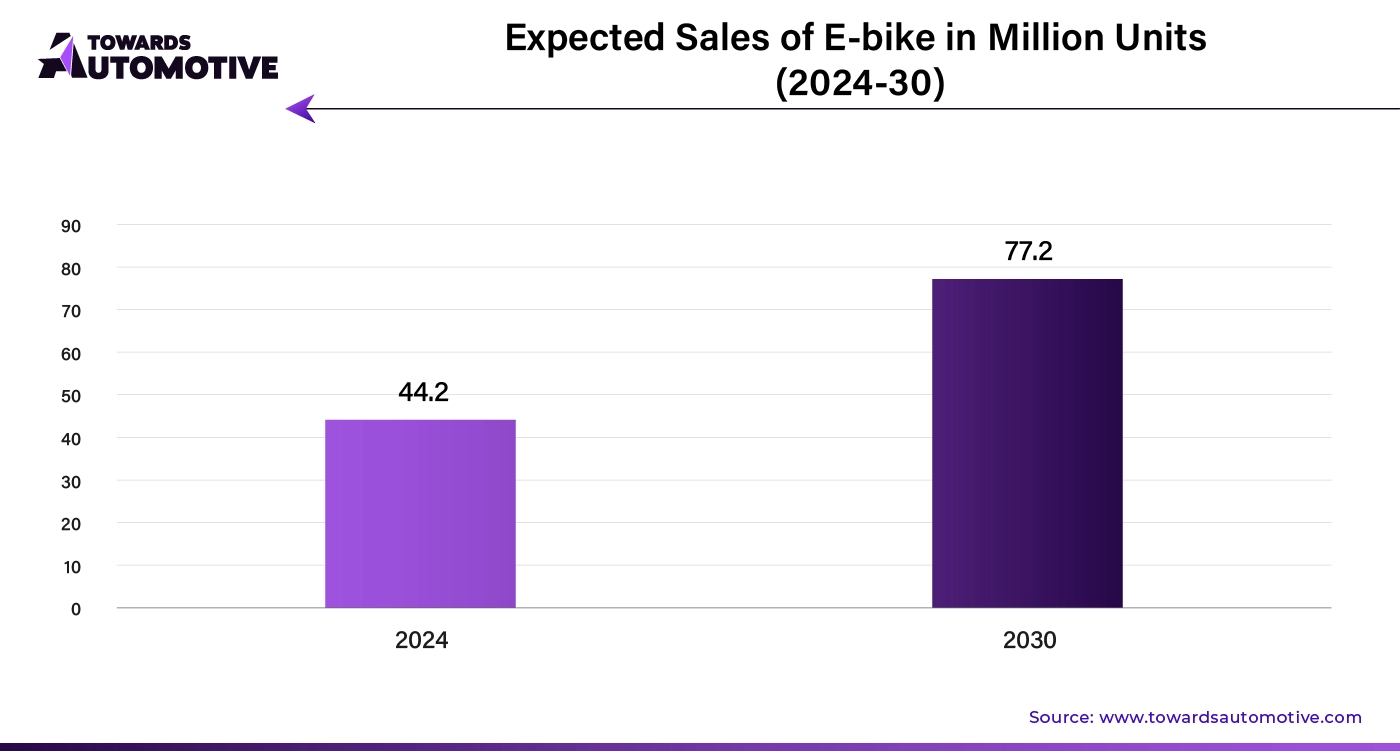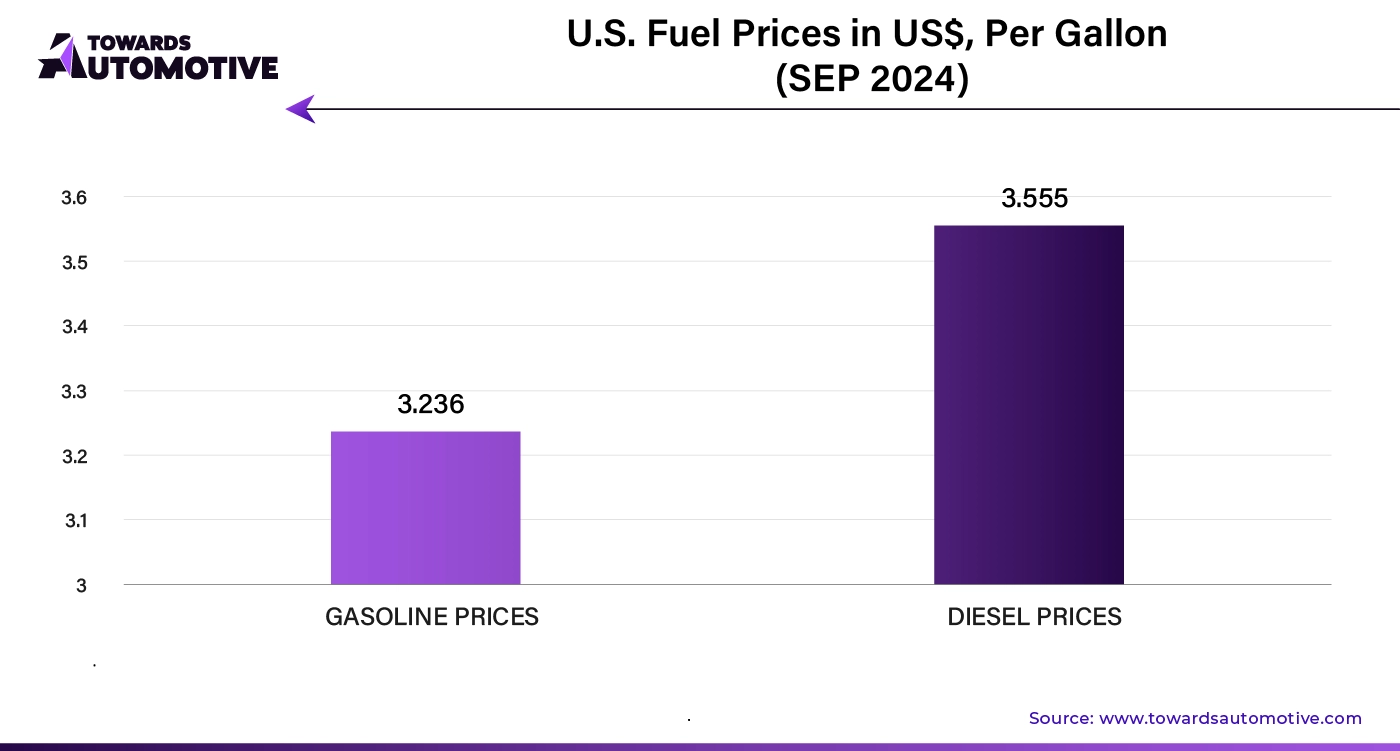March 2025
The E-bike Company Market worldwide is on a rapid upward trajectory, with forecasted revenues anticipated to climb by hundreds of millions of dollars over the period from 2024 to 2034.
The e-bike company market is rapidly expanding as electric bicycles become an increasingly popular mode of transportation across the globe. With growing concerns about climate change, rising fuel costs, and the need for sustainable urban mobility, e-bikes provide an eco-friendly alternative to traditional transportation. These battery-powered bicycles offer a practical solution for commuting, recreational riding, and last-mile delivery services, driving their demand in both urban and rural areas. The market is seeing a surge in innovation, with companies developing lightweight, durable, and high-performance e-bikes to cater to a wide range of consumer needs.
Governments are also playing a crucial role in the growth of the e-bike company market. Subsidies, tax incentives, and infrastructure development for cycling are encouraging people to switch to electric bikes. In addition, cities are implementing policies to reduce traffic congestion and promote green transportation, which further supports e-bike adoption. Companies in this market are benefiting from these government initiatives, expanding their product lines and increasing production to meet the rising demand.
Technological advancements in battery efficiency, motor design, and connectivity features like smartphone integration are transforming the e-bike landscape. Riders can now enjoy longer ranges, faster speeds, and a more personalized riding experience. E-bike companies are also focusing on making their products more affordable and accessible to a broader audience, introducing models at various price points and offering financing options.
The market is highly competitive, with both established bicycle manufacturers and new startups entering the space. Global players are expanding their reach through partnerships, mergers, and acquisitions, while smaller companies are focusing on niche markets or unique designs to stand out. This competition drives continuous innovation and improvement in e-bike technology, leading to better products for consumers.
Furthermore, the growing interest in health and fitness, combined with the convenience of electric assistance, is attracting a wider demographic to e-bikes. Whether for leisure or as a practical means of daily transportation, the e-bike market is poised for significant growth in the coming years. As sustainability and efficiency become top priorities for consumers and governments alike, the e-bike company market will continue to play a vital role in shaping the future of transportation.
AI plays a transformative role in the e-bike company market, enhancing both the design and functionality of electric bikes while improving the overall user experience. One of the primary ways AI is applied is through smart riding systems. E-bikes equipped with AI-powered sensors and algorithms can adapt to various riding conditions in real-time, optimizing power output and battery usage. These systems analyze data such as speed, terrain, rider input, and incline to adjust the level of electric assistance, ensuring a smoother and more efficient ride. This not only extends battery life but also improves the performance of the e-bike in different environments, offering riders a more intuitive experience.
Predictive maintenance is another area where AI significantly impacts the e-bike market. With AI-enabled diagnostic tools, e-bikes can monitor their components and systems, alerting riders or manufacturers about potential maintenance issues before they become critical. This proactive approach helps prevent breakdowns, reduces repair costs, and increases the lifespan of the bike, which adds value for both consumers and companies.
In terms of connectivity, AI-powered e-bikes are increasingly integrated with smartphone apps that provide riders with real-time data on battery status, distance traveled, and route optimization. AI-driven route suggestions can guide riders on the most efficient or scenic routes based on traffic, terrain, and weather conditions. This enhances the rider's experience while also contributing to energy savings.
Moreover, AI is helping e-bike companies improve their product development by analyzing vast amounts of user data to understand consumer preferences and behaviors. This data-driven approach allows manufacturers to fine-tune their designs, features, and pricing strategies, leading to products that better align with market demands.
Growing sales of e-bikes are driving the rapid expansion of the e-bike company market. As more consumers seek sustainable, affordable, and efficient transportation options, the demand for e-bikes has surged across urban and rural areas. This shift is fueled by rising environmental concerns, the increasing cost of fuel, and the need for alternatives to traditional vehicles. E-bikes offer an eco-friendly solution, combining the benefits of cycling with the convenience of electric assistance, making them appealing for commuting, recreation, and even delivery services. As a result, e-bike companies are experiencing significant growth in both sales and market share.
In addition to individual consumers, businesses and governments are contributing to the rise in e-bike sales. Delivery companies are adopting e-bikes to reduce their carbon footprint and improve last-mile delivery efficiency, while government initiatives, such as subsidies and infrastructure development, further encourage the adoption of e-bikes. These factors create a favorable environment for e-bike companies, enabling them to expand their product lines, invest in new technologies, and cater to a growing customer base.
Technological advancements in battery life, motor efficiency, and smart features are also boosting e-bike sales. Consumers are drawn to the longer ranges, improved performance, and connectivity features that make modern e-bikes more convenient and user-friendly. As these trends continue, e-bike companies are well-positioned to capitalize on the growing demand, further driving the market's growth.

Unlock Infinite Advantages: Subscribe to Annual Membership
The e-bike company market faces restraints, including high production costs, which make e-bikes less affordable compared to traditional bicycles. Infrastructure limitations, such as a lack of bike lanes and charging stations, discourage widespread adoption. Battery life and long charging times remain concerns for users, affecting reliability. Additionally, varying regulations across regions complicate market expansion. Competition from other electric mobility options, like electric scooters and cars, also limits growth opportunities for e-bike companies in certain markets.
Advancements in battery technology are creating significant opportunities in the e-bike company market, driving both innovation and growth. As battery performance improves, e-bikes are becoming more efficient, offering longer ranges and faster charging times. These improvements address key consumer concerns, making e-bikes more practical for daily commuting and long-distance travel. Lightweight and compact batteries are reducing the overall weight of e-bikes, enhancing their performance and maneuverability, which attracts a broader range of riders. With more efficient energy storage systems, e-bikes now require less frequent charging, offering greater convenience to users and extending the bike's operational lifespan.
In addition to performance enhancements, advancements in battery technology are leading to cost reductions over time. As production processes become more streamlined and battery materials improve, manufacturers can offer more affordable e-bike models, making them accessible to a wider audience. This affordability opens up new markets, particularly in developing regions where electric mobility solutions are in high demand.
Moreover, new battery designs are also facilitating the development of smart features, such as real-time battery monitoring, energy optimization, and integration with IoT devices. These features give riders more control and insight into their bike's performance, further enhancing the user experience.
Asia Pacific dominated the e-bike company market. Rising urbanization and traffic congestion, technological advancements, and the push for sustainable transportation are driving the growth of the e-bike company market in Asia Pacific. As urban areas across the region continue to expand, the density of vehicles on the road increases, leading to severe traffic congestion. E-bikes offer a practical solution to this problem, providing a nimble, efficient means of navigating crowded city streets and alleviating some of the pressures on traditional transportation systems. This growing demand for efficient mobility solutions is significantly boosting the e-bike market.
Technological advancements are also playing a crucial role in this growth. Innovations in battery technology, motor efficiency, and lightweight materials are making e-bikes more attractive and accessible to consumers. Longer battery life, shorter charging times, and improved overall performance enhance the convenience and appeal of e-bikes, meeting the evolving needs of riders. These technological improvements ensure that e-bikes can handle various urban challenges and long commutes, further driving their adoption.
The shift towards sustainable transportation is another significant factor propelling the e-bike market in Asia Pacific. As environmental concerns become more pronounced, both consumers and governments are prioritizing eco-friendly solutions. E-bikes, which produce zero emissions and offer a greener alternative to traditional vehicles, align with these sustainability goals. Government incentives and policies promoting electric mobility further support the growth of the e-bike market by encouraging the adoption of cleaner transportation options.
North America is expected to grow with a significant CAGR during the forecast period. Rising fuel costs, the pursuit of fitness and leisure activities, and the growing demand for eco-friendly transportation are driving the growth of the e-bike company market in North America. As fuel prices continue to rise, consumers are increasingly seeking cost-effective alternatives to traditional gasoline-powered vehicles. E-bikes offer a practical solution, providing an affordable mode of transportation that reduces the financial burden associated with fuel and maintenance. This economic advantage makes e-bikes an attractive option for those looking to cut transportation costs while enjoying the benefits of an electric-powered vehicle.
The increasing focus on fitness and leisure is another significant driver of e-bike market growth. E-bikes cater to health-conscious consumers by providing a way to engage in physical activity without the strain of traditional cycling. The electric assistance offered by e-bikes allows riders to enjoy longer rides and more challenging terrains while minimizing physical exertion. This appeal to both casual riders and serious cyclists contributes to the rising popularity of e-bikes for recreational purposes.
Furthermore, the growing demand for eco-friendly transportation is playing a crucial role in the expansion of the e-bike market. As environmental awareness increases, consumers and policymakers alike are prioritizing sustainable solutions to reduce carbon emissions and promote greener lifestyles. E-bikes, which produce zero emissions and offer a cleaner alternative to conventional vehicles, align perfectly with these environmental goals. Government incentives and policies supporting electric mobility also bolster the market by making e-bikes more accessible and appealing to a broader audience.

Europe is projected to grow with a notable growth rate during the forecast period. Rising environmental awareness, the development of dedicated bike lanes and charging stations, and supportive government policies and incentives are driving the growth of the e-bike company market in Europe. As environmental concerns become more pressing, European consumers are increasingly seeking sustainable transportation options. E-bikes align perfectly with this shift, offering a green alternative that reduces carbon emissions and promotes eco-friendly commuting. This heightened awareness of environmental issues is boosting demand for e-bikes across the continent.
The expansion of dedicated bike lanes and charging stations plays a crucial role in supporting e-bike adoption. European cities are investing heavily in infrastructure that makes cycling safer and more convenient. Dedicated bike lanes reduce the risk of accidents and provide a smoother, more enjoyable riding experience. Meanwhile, the growing network of charging stations ensures that e-bike users can easily recharge their batteries, addressing one of the key practical concerns associated with electric mobility. This improved infrastructure makes e-bikes a more viable option for daily commutes and long-distance travel.
Government policies and incentives are also significantly driving the e-bike market in Europe. Many European countries offer subsidies, tax breaks, and other financial incentives to encourage the purchase of e-bikes. These policies lower the cost of entry for consumers and make e-bikes more accessible. Additionally, governments are implementing regulations that favor electric mobility, such as stricter emissions standards for vehicles and support for green transportation initiatives. These measures create a supportive environment for e-bike companies, facilitating market growth and expanding the adoption of e-bikes across Europe.
By Region
March 2025
February 2025
February 2025
January 2025
We offer automotive expertise for market projections and customizable research, adaptable to diverse strategic approaches.
Contact Us